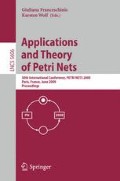Abstract
We present a novel, operational, formal model for scenario-based modeling with Petri nets. A scenario-based model describes the system behavior in terms of partial runs, called scenarios. This paradigm has been formalized in message sequence charts (MSCs) and live sequence charts (LSCs) which are in industrial and academic use. A particular application for scenarios are process models in disaster management where system behavior has to be adapted frequently, occasionally at run-time. An operational semantics of scenarios would allow to execute and adapt such systems on a formal basis.
In this paper, we present a class of Petri nets for specifying and modeling systems with scenarios and anti-scenarios. We provide an operational semantics allowing to iteratively construct partially ordered runs that satisfy a given specification. We prove the correctness of our results.
Access this chapter
Tax calculation will be finalised at checkout
Purchases are for personal use only
Preview
Unable to display preview. Download preview PDF.
References
Damm, W., Harel, D.: LSCs: Breathing Life into Message Sequence Charts. Form. Methods Syst. Des. 19(1), 45–80 (2001)
Desel, J.: From human knowledge to process models. In: UNISCON, pp. 84–95 (2008)
Fahland, D., Woith, H.: Towards process models for disaster response. In: Ardagna, D., et al. (eds.) BPM 2008 Workshops. LNBIP, vol. 17, pp. 244–256. Springer, Heidelberg (2008)
Mukund, M., Kumar, K.N., Thiagarajan, P.S.: Netcharts: Bridging the gap between HMSCs and executable specifications. In: Amadio, R., Lugiez, D. (eds.) CONCUR 2003. LNCS, vol. 2761, pp. 293–307. Springer, Heidelberg (2003)
Mauw, S., Reniers, M.A.: An algebraic semantics of Basic Message Sequence Charts. The Computer Journal 37, 269–277 (1994)
Harel, D., Kugler, H.: Synthesizing State-Based Object Systems from LSC Specifications. In: Yu, S., Păun, A. (eds.) CIAA 2000. LNCS, vol. 2088, pp. 1–33. Springer, Heidelberg (2001)
Hélouët, L., Jard, C., Caillaud, B.: An event structure based semantics for high-level message sequence charts. Mathematical. Structures in Comp. Sci. 12(4), 377–402 (2002)
Engelfriet, J.: Branching processes of Petri nets. Acta Inf. 28(6), 575–591 (1991)
Reisig, W.: Elements Of Distributed Algorithms: Modeling and Analysis with Petri Nets. Springer, Heidelberg (1998)
Esparza, J., Heljanko, K.: Unfoldings - A Partial-Order Approach to Model Checking. Springer, Heidelberg (2008)
Kluge, O.: Petri nets as a semantic model for Message Sequence Chart specifications. In: INT 2002, Grenoble, France, pp. 138–147 (2002)
Harel, D., Kugler, H., Marelly, R., Pnueli, A.: Smart play-out of behavioral requirements. In: Aagaard, M.D., O’Leary, J.W. (eds.) FMCAD 2002. LNCS, vol. 2517, pp. 378–398. Springer, Heidelberg (2002)
Desel, J., Juhás, G., Lorenz, R., Neumair, C.: Modelling and validation with VipTool. In: van der Aalst, W.M.P., ter Hofstede, A.H.M., Weske, M. (eds.) BPM 2003. LNCS, vol. 2678, pp. 380–389. Springer, Heidelberg (2003)
Bergenthum, R., Desel, J., Lorenz, R., Mauser, S.: Synthesis of Petri Nets from Finite Partial Languages. Fundam. Inform. 88(4), 437–468 (2008)
Bergenthum, R., Mauser, S.: Synthesis of Petri Nets from Infinite Partial Languages with VipTool. In: AWPN 2008, Rostock, Germany, University of Rostock (September 2008)
Hee, K., Serebrenik, A., Sidorova, N., Voorhoeve, M., Werf, J.: Modelling with History-Dependent Petri Nets. In: Alonso, G., Dadam, P., Rosemann, M. (eds.) BPM 2007. LNCS, vol. 4714, pp. 320–327. Springer, Heidelberg (2007)
Barros, J.a.P., Gomes, L.: Net model composition and modification by net operations: a pragmatic approach. In: Proceedings of INDIN 2004, Berlin, Germany (June 2004)
Rinderle, S., Reichert, M., Dadam, P.: Evaluation of correctness criteria for dynamic workflow changes. In: van der Aalst, W.M.P., ter Hofstede, A.H.M., Weske, M. (eds.) BPM 2003. LNCS, vol. 2678, pp. 41–57. Springer, Heidelberg (2003)
Ehrig, H., Hoffmann, K., Padberg, J., Prange, U., Ermel, C.: Independence of net transformations and token firing in reconfigurable place/transition systems. In: Kleijn, J., Yakovlev, A. (eds.) ICATPN 2007. LNCS, vol. 4546, pp. 104–123. Springer, Heidelberg (2007)
Author information
Authors and Affiliations
Editor information
Editors and Affiliations
Rights and permissions
Copyright information
© 2009 Springer-Verlag Berlin Heidelberg
About this paper
Cite this paper
Fahland, D. (2009). Oclets – Scenario-Based Modeling with Petri Nets. In: Franceschinis, G., Wolf, K. (eds) Applications and Theory of Petri Nets. PETRI NETS 2009. Lecture Notes in Computer Science, vol 5606. Springer, Berlin, Heidelberg. https://doi.org/10.1007/978-3-642-02424-5_14
Download citation
DOI: https://doi.org/10.1007/978-3-642-02424-5_14
Publisher Name: Springer, Berlin, Heidelberg
Print ISBN: 978-3-642-02423-8
Online ISBN: 978-3-642-02424-5
eBook Packages: Computer ScienceComputer Science (R0)

